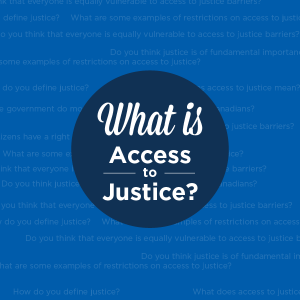 What does the public think about the justice system? What does justice mean to everyday Canadians? We interviewed 99 Canadians in the Greater Toronto Area and have captured their responses in our colourful new infographic “What is Access to Justice?”You can see the infographic at: www.cfcj-fcjc.org/infographics/what-is-a2j
What does the public think about the justice system? What does justice mean to everyday Canadians? We interviewed 99 Canadians in the Greater Toronto Area and have captured their responses in our colourful new infographic “What is Access to Justice?”You can see the infographic at: www.cfcj-fcjc.org/infographics/what-is-a2j
The infographic is based on the “What is Access to Justice” project conducted by CFCJ Chair Trevor Farrow. As part of the project, CFCJ members interviewed people in Toronto on justice-related questions and issues. By conducting these interviews, the project has framed the access to justice debate in client-centered, problem-based and democratic terms. Some of the questions asked were, “How do you define justice?”, “Have you ever faced access to justice barriers?”and “Do you think that everyone is equally vulnerable to access to justice barriers?” The responses gathered were as insightful as they were varied. Overall, people thought justice was a fundamental issue to Canadians, and people should have a right to justice. But perhaps the most interesting recurring theme was that justice means more to people than a fair trial and equitable access to courts. Justice, at its root, is all about the good life. Respondents described justice as accessing equality, understanding, education and happiness, as well as basic needs such as food, housing, and security.
So what does that tell us? Well, for starters, justice system workers need to listen to the voice of everyday Canadians when making policy decisions concerning justice reform. But this responsibility goes both ways —citizens may also have a duty to engage meaningfully in access to justice discussion and debate. And as this project shows, many people are more than willing to think critically about the justice system and how it could be improved —all you have to do is ask.
In addition to an infographic and video series, an in-depth discussion of findings from this project will be presented in Trevor Farrow’s forthcoming paper for the Osgoode Hall Law Journal.
